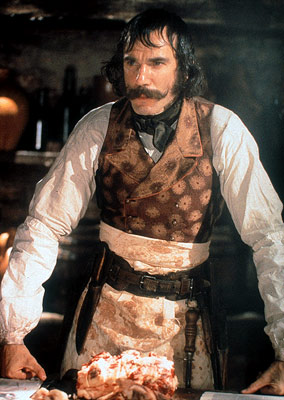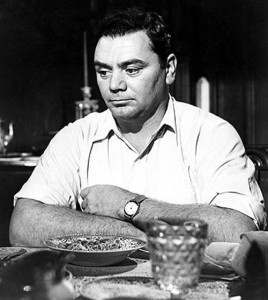
I’ve been preoccupied lately with the role of butchers in society, for obvious reasons. Many members of my mother’s family — including Siegmund Kornmehl, Freud’s butcher — were in the meat-buying, -cutting and -selling business in Vienna and I’ve been exploring their lives.
In several instances, I’ve encountered a distinctive lack of respect for the trade. B’nai B’rith International met my inquiry into whether Sigmund Kornmehl might have been in the same fraternal lodge as Freud with immediate denial, noting that only doctors, lawyers, artists, etc. were admitted. And Freud’s Wife, a novel, has the title character expressing disgust over the fact that the Freuds moved into a building where there was already a Sigmund — and that the person with the same first name was a butcher.
The horror.
But butchers were also powerful in Vienna, according to an 1897 article in The Sydney Morning Herald about the Austrian meat trade.
Butchers run the gamut on the respect spectrum in contemporary culture, too.
Cinematic Butchers

Movies with “butcher” in their titles or plot synopses come in several varieties.
There are horror flicks and dramas in which the term is used to refer to brutal killers.
Then there are darkly humorous films, often foreign, that include butchers as emblematic characters and plot devices. One reviewer categorized the Danish Green Butchers and other similar films — Sweeney Todd and Delicatessen among them — as examples of “art house cannibalism.”
I’m only interested here in movies with traditional plots where the profession is relevant to a character’s development and no ingestion of human flesh is involved.
The prime example is Marty. Played by Ernest Borgnine, the butcher is a nice guy, but kind of a schlub. The plot is described by Wikipedia:
Marty Piletti, a heavy-set Italian-American butcher, lives in The Bronx, New York City, with his mother… Unmarried at 34, the good-natured but socially awkward man faces constant badgering from family and friends to get married, pointing out that all his brothers and sisters are already married with children.
Less well known but cut from the same cloth — or is that beef flank? — as Marty is the character played by George Dzunda, the butcher in The Butcher’s Wife. The premise: Demi Moore is a clairvoyant who misreads the signs and marries a working class meat vendor instead of the doctor for whom she is intended. As in Marty, the choice of profession just signifies a lack of glamor.
In a different category altogether is Bill “the Butcher” Poole, played by Daniel Day-Lewis in Martin Scorsese’s Gangs of New York. The character is based on a historical 19th-century American gangster, William Poole, who was in fact a butcher. Although Bill is known for his brutality in fighting rivals, his nickname alludes to his profession as a meat cutter as well.
Missing eye notwithstanding, Bill is considered attractive by many film goers (hand raised here). I’m not sure whether that’s in spite of the character’s air of menace or because of it — or because Daniel Day-Lewis is sexy.
Which brings me to today’s dining scene.
Butchers as Beefcake
If you only encounter a butcher on the rare occasion when one emerges from the back of your local supermarket to stock the cold cases of meat — or, as I have done, seek him out to ask if he would cut smaller-size pieces of marrow bones for my smaller-size dog — you may be surprised to learn that butchers have become trendy figures on the international food scene.
This phenomenon was detailed in the San Francisco Magazine’s “Famished: Respect The Beast”::
The glamorization of the profession of butchering is, no doubt, intertwined with the philosophy of respecting an animal enough to consume all of it—or “nose-to-tail eating,” as London-based chef Fergus Henderson dubbed it in 2004 for his cookbook The Whole Beast. The cult movement he started nobly encourages cooks and eaters alike to venture beyond the white-meat safety zone, and in so doing it has sparked an obsession with meatmongers that flourishes to this day.
The New York Times covered the territory in 2009 in a piece that describes the “hipster hottie butchering phenomenon” (yup, I couldn’t make that up):
There is a new kind of star on the food scene: young butchers. With their swinging scabbards, muscled forearms and constant proximity to flesh, butchers have the raw, emotional appeal of an indie band. They turn death into life, in the form of a really good skirt steak.
And it doesn’t hurt that some people find them exceptionally hot.
‘Think about it. What’s sexy?’ said Tia Keenan, the fromager at Casellula Cheese and Wine Café and an unabashed butcher fan. ‘Dangerous is sometimes sexy, and they are generally big guys with knives who are covered in blood.’
It could be argued that those who do the slaughtering themselves — as many do — turn life into death. And that a “really good skirt steak” is hardly a miracle of nature. Nor do I think I’d like to buy cheese from a “fromager” who likes big guys with knives covered in blood in real life — as opposed to, say, the ones you see on screen.
And the “indie band” analogy?
I suspect my middle-class Viennese relatives, all family men — as far as I know — would have been baffled by the notion of being considered rebels, but they might not have minded the butcher groupies.

I can understand the attraction to DDL as Hawkeye, but Bill? Not so much. 🙂
Yeah, I know — I forgot to mention the greasy hair. I guess it’s just the hottie butcher phenomenon…
I’ll admit to being one who ‘looked down’ on the profession – until I saw “Crossing Delancey Street” – which albeit about a pickle man, same snobbery at work – and realized I too had fallen for the worthless narcissistic types too long – . long story short(:
Yes, it’s easy to fall into that kind of snobbery. I guess with butchers you can have the so-called danger — and the down to earth working class guy.
My grandfather was a butcher way back. He was no Bill as in Gangs of New York, but he was sorta beefcakeie.
Interesting, Deborah! I didn’t know we had that family history in common. You’ll have to send a picture of your beefcakeie grandfather — I’ll post it!
I’ve always kinda viewed butchers with a form of awe and found them really intimidating. Maybe it’s because of the way they handle knives with ease, I’m not sure. And it’s definitely always appeared as a very masculine profession. There is a butcher shop in Halifax that opened recently and is owned by a woman. For whatever reason, this stunned me for a moment, and I consider myself a feminist.
Don’t feel bad, Kristine. It might be genetic. According to a study that the San Francisco Chronicle article links to:
So don’t worry about your feminism!
What? There’s no TV star butcher coming out of the Food Channel? Maybe I need to take another look.
Don’t forget Nick Cage in Moonstruck. Hottie butcher, indeed 😀
Karen, he was a baker!! My whole post was focused around him; I even had his picture where my picture of Daniel Day Lewis now is. And then I checked the plot again and sure enough — he lost his hand slicing bread! It’s so funny that I wasn’t the only one who was sure he was a butcher.
Crap! I could have sworn that he was a butcher!!
Me too!